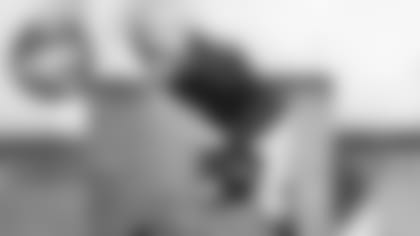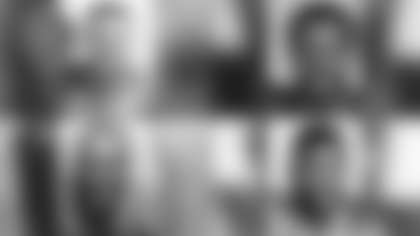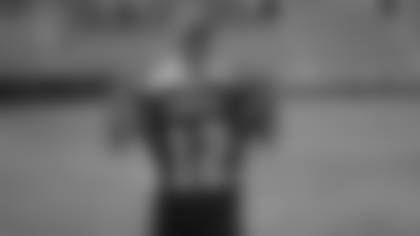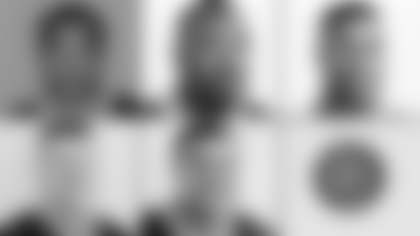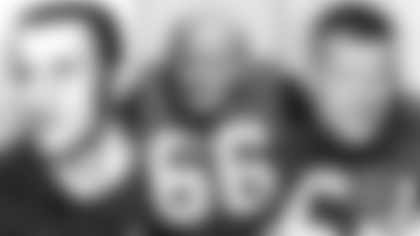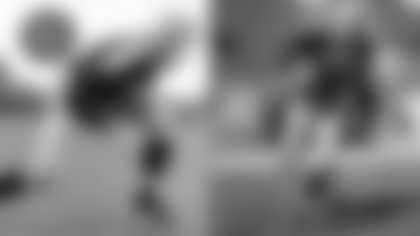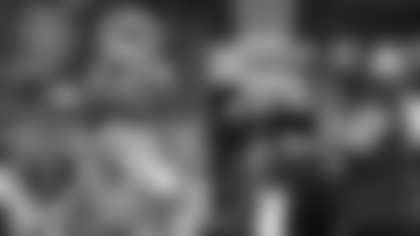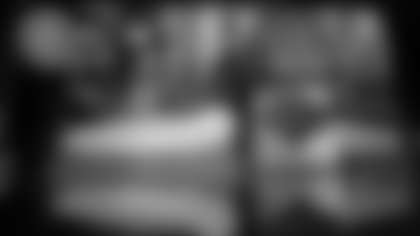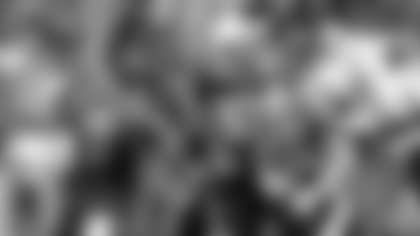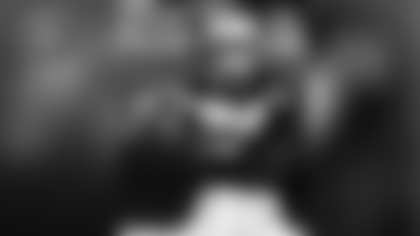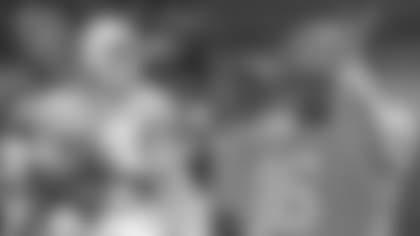Cliff Christl started gathering oral histories with former Packers and others associated with the team in 2000 and will continue to gather them as Packers historian. Excerpts from those interviews will be periodically posted at www.packers.com
Paul "Buddy" Burris, a fifth-round choice, or 31st overall, in the 1947 NFL Draft, played for the Packers from 1949 to 1951. As a rookie, he played for Curly Lambeau in what was his final season as coach. The next two years Burris played for Gene Ronzani. In Burris' three seasons with the Packers, they were 8-28. In college, he was the first and to this day one of only two three-time All-America football players at the University of Oklahoma. Burris played guard at Oklahoma from 1946 to 1948 when the Sooners went 26-6-1, including two seasons under legendary coach Charles "Bud" Wilkinson. As a freshman, Burris played at the University of Tulsa in 1942, then spent 34 months in the Army during World War II. Bothered by injuries in his first and last season with the Packers, Burris, who stood 5-foot-11 and weighed 215 pounds, played in 29 games both at guard on offense and middle guard on defense.
On Curly Lambeau: "I didn't like him. He just wasn't my type of guy. He was the Hollywood type. One of our problems was that Lambeau had five or six players that he confided in and the rest of us were on the outside."
On Lambeau's favorites: "I'll tell you they had a clique. I'm not bad-mouthing them. But it was Bob Forte, Tony Canadeo. I suspected Dick Wildung. I remember those three or four. (Lambeau) had favorites. We had some good football players, but he didn't like them. I think he played more according to who he liked than according to your ability."
On playing next to Wildung, a Pro Bowl tackle in 1951: "We played somebody and we had a screwed-up defense where if one of the halfbacks went in motion, whether he went one way or the other way, you changed your charge. Whoever we played that day, they went in motion and our charge changed. If you went to the left, you went to the right or whatever. Dick went the wrong way. He was a good football player. Captain of the team, all-pro. Everybody liked him, but he went the wrong direction. I think it was (assistant coach) Dick Plasman jumped all over me when we got the film back. It looked like I went in the wrong direction. They had split us up the middle. But Dick stood up when we were having a skull session and said, 'Hey coach, that's not right. I went the wrong way. Buddy did the right thing.' I always respected Dick for that. A lot of guys wouldn't do that."
On Wildung's strengths as a player: "Wildung was a good, clean, tough football player. A damn good football player."
On Bob Forte, a two-way back who played from 1946-50 and again from 1952-53: "He was over the hill when I played, but he was still a damn good utility player."
On tackle Paul Lipscomb, who played from 1945 to 1949: "He was a good football player. He was tougher than a boot. You couldn't hurt him. I don't think Lambeau liked him."
On Ed Neal, the Packers' 300-pound center and middle guard from 1945-51: "You know the guy Hoss on Bonanza? (Neal) was a replica. He wouldn't hurt a fly. He was just a good old boy. Never got mad at anybody. But he was probably the strongest man in football at the time."
On quarterback and defensive back Jack Jacobs, who was a high school legend at Muskogee, Okla., before Burris played there: "He was a good athlete. He could punt, run, pass. He was tougher than hell. They played him on defense at cornerback and he was the quarterback. He ran hard. He tackled hard. He was a tough guy. He was a hitter."
On facing a hometown legend in training camp as a rookie: "I got hurt playing in the College All-Star Game. I missed two weeks of practice, but one day they put me in and (Jacobs) was the quarterback. I'll never forget this. Jack went back to pass and he was faking the ball. You were supposed to go with the fake. You know where they'd double-dig you and trap you. So I didn't go for the fake; I went for Jack. I grabbed him around the waist and held him, and he hit me in the face with his elbow. He said, 'Don't ever grab me. Tackle me!' That made him mad because I didn't pull him to the ground. So the rest of that afternoon, I beat him to a pulp. I hit him every play whether he had the ball or not. Boy, he was tough."
On Jacobs' toughness as a defensive back: "We were playing the Cardinals. They had big, old Mal Kutner as an end. An All-American from Texas. Mal Kutner comes down about five yards and is going to catch a hook pass. You could see it later on the film where Kutner went up to catch that pass and Jack changed his stride – otherwise he would have got there too soon – and hit him in the back. He almost killed him. The word went out around the league: 'Don't ever throw a hook pass in front of Jack.' (Kutner's) helmet went flying off and he laid there for awhile."
On Jacobs' relationship with Lambeau: "Jacobs was probably the best athlete we had on the team in '49. I didn't like Jack, but neither did Curly. And Curly didn't play him very much. He was mad at him all the time and you can't do that to your good players."
On whether Jacobs caused problems off the field: "Yeah, he drank a lot. I remember coming back from Milwaukee. We had a guy on our team named Bill Kelley. We called him 'Wild Bill.' We were coming back on the train. Jack was sitting on one side, I was sitting in the middle and Wild Bill was on the other side of me. We were discussing something that happened in the ballgame; it wasn't that important. Jack was saying one thing and Wild Bill was looking at it a different way. Jack just turned right across me and hit old Bill right in the face with his fist and said, 'I don't like you anyhow, you son of a (bleep).' Bill didn't do anything, other than just disagree. But Jack just turned around and knocked the hell out of him. He bloodied his nose."
On whether other players got involved in the scuffle: "Urban Odson, one of the guys from Minnesota, found out about it. We had done a little drinking now, coming back from a ballgame. Odson was a big old boy. Tough. When he walked down that train, I think that train rocked with him. Jack was a fighter. Odson said, 'I'm going to kill that son of a (bleep).' He came down that train looking for Jack and this wasn't like Jack. Jack was mean. He'd fight anybody. But he didn't want to fight Urban Odson on that train and he hid under one of those seats."
On Odson's play as a tackle from 1946-49: "He was meaner than hell. I don't know what he did in Green Bay outside of that he kept out of the penitentiary. He was tough and mean and didn't give a hoot."
On Stan Heath, the No. 5 overall draft choice in 1949 and one of the other two quarterbacks in 1949, along with Jacobs: "Stan Heath was my roommate at the College All-Star Game. He wasn't a very good athlete. I don't know. That was where we screwed up a lot. Maybe he should have been playing first string. Who knows? I don't know if he ever got a chance."
On Heath lasting one season after being a No. 1 draft choice: "I'll tell you something that happened to him up at the All-Star Game. This might have had something to do with what happened to him in Green Bay. We had a big old boy from Texas A&M named Rob Goode who played with the Washington Redskins. He was a fullback and we were scrimmaging. They put Heath in there and told him to stand at free safety. Rob Goode ran up the middle and nobody touched him. He was moving like a big, old freight train and Stan Heath was standing there. (Goode) hit him head on, stepped right over the top of his chest and kept right on going. Knocked him out. They had to carry Heath off on a stretcher. He was my roommate and the next day about 2 o'clock in the afternoon, he raised his head off the bed and asked, 'Where am I?' I don't think he ever recovered. He got the hell knocked out of him."
On Jug Girard, the third quarterback in 1949: "He was a (darn) good football player. A (darn) good athlete. He could have almost played anywhere. He was a winner."
On Tom Stidham, Lambeau's line coach: "He didn't do much. He was the head coach at OU at one time. He didn't do anything to speak of. He was a yes man for (Lambeau)."
On Gene Ronzani: "He was a jokester on and off the field. Always laughing, cutting up with the players. He was a pretty good old boy really, but he wasn't a very good football coach."
On whether Ronzani maintained discipline within the team: "I remember an end from Arkansas, Al Baldwin. He was a good end, too. We were practicing and Ronzani was always joking with the guys. Anyway, Baldwin is coming back to the huddle and Ronzani was chewing him out. He gives Ronzani the gesture where you put your thumb to your nose and turn it a little bit. Ronzani fined him like $500, just for that gesture. But (Ronzani) was the kind of guy who was asking for it. For instance, I had a coach down at OU, Bud Wilkinson. That would be one of the last things he would do."
On Tarz Taylor, Ronzani's line coach: "He was just a good old boy. You talk about a yes man, he wouldn't tip over a boat. I liked him. I hate to say that. You'd play football for him just because you liked him."
On linebacker Clayton Tonnemaker, the fourth overall pick in the 1950 draft, an all-pro and Pro Bowl selection as a rookie who then spent two years in the military and never regained his form: "He was the best football player Green Bay had while I was there. He was fast and big and strong. And he knew football."
On Tobin Rote, Packers quarterback from 1950-56: "I had good feelings about Tobin. He was just a good, old country football player. Tougher than hell. (Darn) good passer. He didn't run very fast, but he had a good arm on him."
On Bob Mann, the Packers' first African-American player: "The football players liked him a lot. He was a good old boy. He was a good athlete and a good football player. He was one of the best ends in football in my opinion."
On Rebel Steiner, a defensive back from 1950-51: "He was mean, fast, strong. He wasn't exactly my friend. We had those hard helmets back then. We were out in California, somewhere around Palo Alto getting ready to play the 49ers, and we went back to the huddle and he hit me on the head. He thought it was funny. He was a jokester. I was having a bad day anyhow and I said, 'Rebel, now don't do that anymore.' He did it about three, four times. I said, 'You do it again, I'm going to knock the hell out of you.' Then, he started faking like he was going to. One time he started faking and raising his arm up and I caught him just right. Knocked him down right in the huddle. He had it coming. Everybody laughed, but he didn't."
On playing at old City Stadium behind Green Bay East High School: "I remember the wood and the small benches, the flat tables and the whirlpool. I guess we had some electrical stuff. The locker room, I don't remember any heat in there. The lockers were just made out of wood with planks on the wall where you hung your clothes. And if somebody got hurt, our trainer, (Bud) Jorgensen would set you down on a table, rub you down, pat you on the butt and tell you to get to it. I've always told people, 'If you could walk, talk, breathe or run, you could play.'"
On the Packers nearly running out of money in 1949: "We all knew they were hard up. I didn't think they'd be back the next year (after '49) because of the stadium. Man, that was run down. Our training room wasn't but 15 by 15, maybe 20. It had hardly anything in it but a couple tables and a whirlpool. That was really pathetic. I came from Oklahoma and our facility there was much better than Green Bay. I didn't think they'd be able to make their payroll."
On the injury that ended his career: "I had a pinched nerve in my back the last year. My shoulder would paralyze on me. I couldn't even raise my arm. When it first started, two or three minutes, it would come back to normal and they'd say, 'Go back in there.' So I'd go back in. But it finally got where I'd hit my shoulder and it would go numb. Then when it would come back around it would really hurt. I didn't have pain when it first started."
Burris died in 2007 at age 84. The above interview was conducted in 2001.



